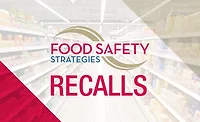KSU Researchers Evaluate the Cost of Meat and Poultry Recalls
Kansas State University (KSU) conducted a study, Costs of Meat and Poultry Recalls to Food Firms, using stock market prices and other data originating between 1994 and 2013 to determine how a company’s bottom line is ultimately affected when a meat or poultry recall arises.
For that 19 year period, KSU researchers looked at data from the U.S. Department of Agriculture’s (USDA) Food Safety and Inspection Service (FSIS) and uncovered more than 1,200 meat and poultry recalls were recorded; 163 of which came from 31 different publicly traded firms.
KSU’s research findings:
- It takes 4-5 days for stock prices to reflect a food recall
- Stock prices plummeted sooner--within 1 day--if the recall also included a major health hazard
- When a health hazard is involved, stock prices dropped by an average of 1.15 percent, “which could translate to a loss of hundreds of millions of dollars for some firms.”
- Stock prices will rise and/or fall in relation to response at the investor level and how confident investors are with the handling of the recall
Stock price fluctuations were used in KSU’s study since specific financial data is difficult to obtain. Also, determining the hard cost of a recall involves many factors that are difficult to measure. For example, what stock prices do not account for is the cost that’s passed on to the consumers affected by the recall--medical bills, time off from work and the like.
So, what factors most impact stock prices of these publicly traded food firms?
- Severity of the recall--This refers to how hazardous it is to human health. Pathogens such as Escherichia coli, Salmonella and Listeria are examples of the most severe recalls.
- Recall size--Larger recalls tend to result in more financial damage.
- Firm size--Larger, more diverse firms might take less of a direct financial hit, but costs like insurance premiums would rise. Smaller firms are most likely to go bankrupt, especially if the recalled item is their primary product for sale.
- Firm’s experience--The repercussions of a second recall tend to be less severe than that of the first--if the initial recall was handled properly and the company was able to regain consumer and investor confidence.
- Media--More media coverage tends to equate to more damage.
The benefit of this study is to show food companies (including processors, merchandisers and suppliers) what the financial impact of a food recall can be. This can help firms to decide how much they can afford to spend on food safety technologies that prevent such recalls from taking place. The study is also a plus for investors who likely want to know about a company’s food safety procedures and plans before investing funds.
Looking for quick answers on food safety topics?
Try Ask FSM, our new smart AI search tool.
Ask FSM →







